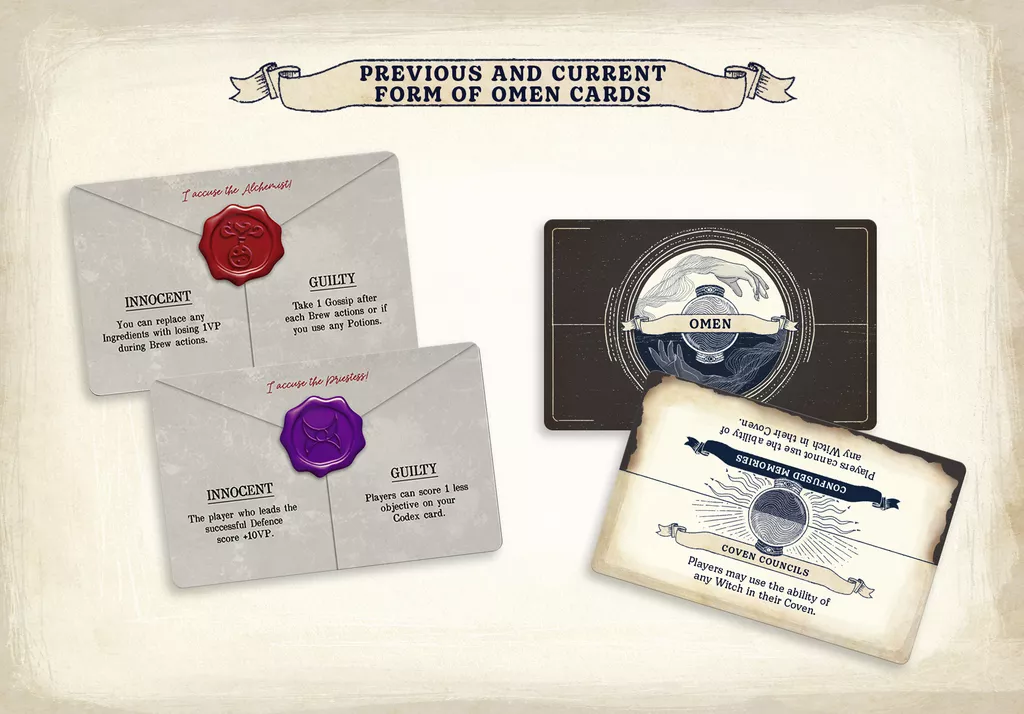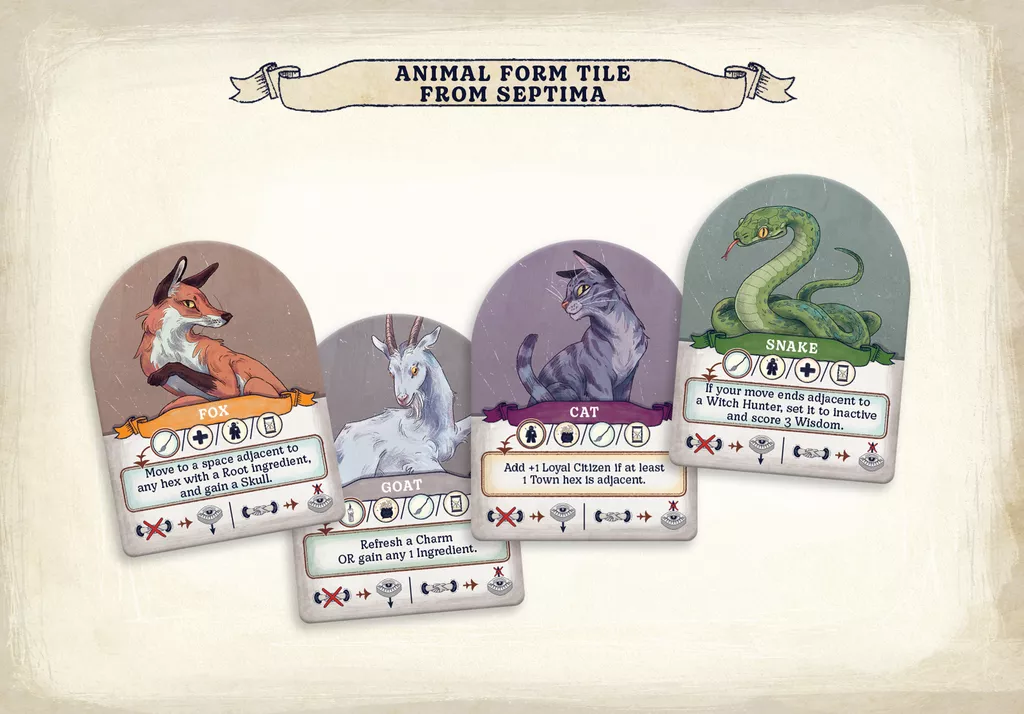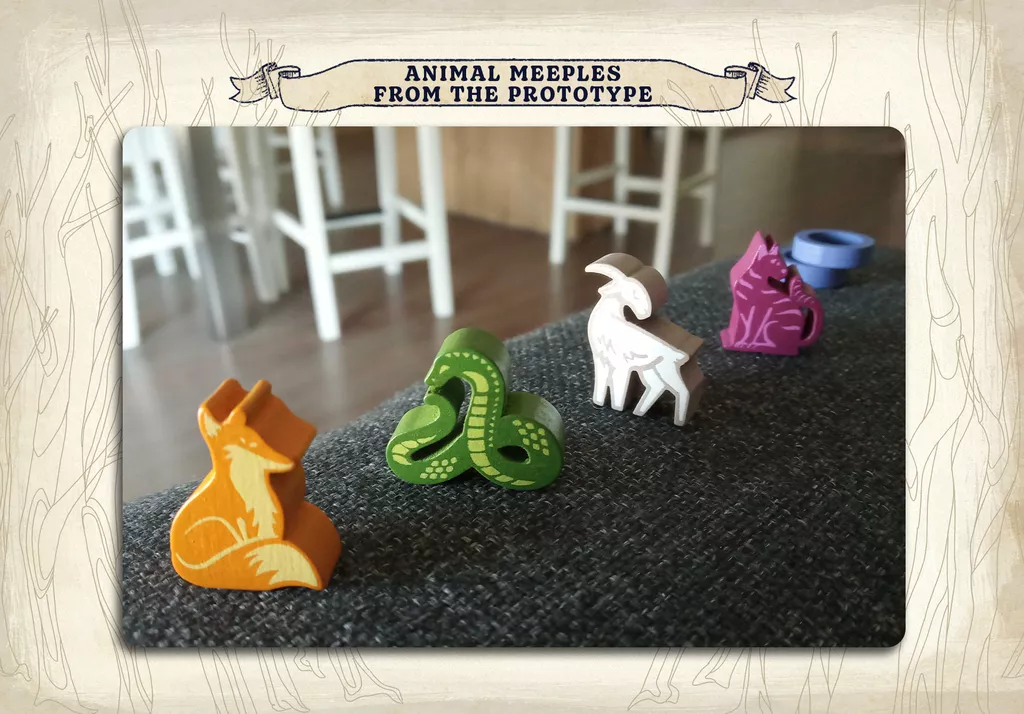Advanced game modes and modularity in Septima
June 10, 2022
Septima Design Spotlight #6
Hello everyone! I’m back with the sixth and final entry of our Designer Diary series. I’m incredibly excited for the Kickstarter launch in exactly one week, but before we reveal everything there, today I’m bringing you a sneak peek at the modules and alternate game modes of Septima.

Events have always been something I wanted to introduce to Septima, not just to further increase the replayability, but also to enrich the theme and make the world even more vivid.
Implementing Events as a result of the Trials seemed like a good fit, and changing their effect depending on the Trial’s outcome added an interesting twist to them. Early on, I implemented this very directly: each Event would say, “I blame the [insert job or social position here]“, and had two different outcomes. For example, if the Daysman was blamed during the Trial and they were exiled, all player’s Collect actions would become less efficient for the next Season, but if they were released, they showed us their gratitude and made our Collect actions in the next Season much more effective.

This worked quite well while the Witches had nothing to their character but a name and maybe a placeholder illustration, but as I developed their backstories, the potential disconnects between a character’s personality and the job/social position an event would randomly assign to them could get very odd. How could the nimble and adventurous Serena be a daysman? Or Albert a librarian? A library would clearly just burn down if he ran it… So while I really liked the variable conditions giving extra flavor to each Season and a new strategic layer, a retheming was due.
The new idea was that the positive and negative outcomes on the cards could also be alternative paths of the future, and as the character of Septima took shape, future sight was an easy and thematic solution. The gifted High Witch can see glimpses of the future, but in true “wise fantasy character” fashion, she only shows us the possibilities, not the definitive outcome. So the events became Omens of the Septima, with an outcome still based on the result of the Trials.
But why is it a module, and not part of the core game? It used to be early on, but I figured that the kind of ‘rule overwriting’ some of the more interesting Omens required made the game a bit harder to get into (after all, they change a rule someone just learned), and I wanted to keep the core experience of Septima as accessible as possible. So the Omens ended up being a solid optional module, adding a very thematic and exciting strategic layer for experienced players.

The most common question that pops up when I am pitching Septima is “can you transform into animals?” Well, the idea of transfiguration has been with me from the very beginning, but it seemed a little too much to fit into the mechanical framework. Each Action card’s effect is instant but this one needs to be an ongoing effect, it needs to be very thematic, and work well with all other actions and options in the game. So it didn’t really click as a core concept, but can you imagine any decent witch who does not want to turn into a cat? Or a snake? So once we decided that it is OK to have this option in the game as a module (so there’s no need for it to be too simple, because I can count on players already being familiar with the game), we could go with a full-on “theme first” approach and the module basically ‘designed itself’.

There is almost no setup involved: the players simply switch their Chant action card to the Transfigure card, each coven takes their animal meeple and you’re ready to go! With Chant gone, Transfiguration is now your main way to mitigate Suspicion: as you transform, your character ‘disappears’, so after each action you resolve while still in animal form, your Suspicion level decreases.
But in that case, why not just stay a cat and solve the Witch Hunter problem forever? That’s the tricky part: the possible actions for an animal is limited to three and tailored for their attributes, but one of those is actually very effective for them. A snake can move, recruit Loyal citizens (with its silver tongue) and heal but no other actions are possible in this form. However, as a snake, your Move action also allows you to attack Witch Hunters, neutralizing them for a round and scoring Wisdom for it. Each animal has their own set of possible actions and abilities, introducing not just an interesting new way to manage your Suspicion, but also a slight asymmetry between the four Covens.


We at MCG are incredibly proud of and thankful to the huge solo community that gathered around our games, and we are very aware that solo gaming is becoming an increasingly popular way to explore new games. Making a solo mode for Septima was an obvious choice since the card matching mechanism lends itself very well to it, and the development couldn’t be in better hands than Dávid Turczi and his solo dev team.
It is a bit too early to go into details on the solo mode, but I can already tell that you’ll be pitted against the Black Widow, an opponent who is basically the Septima’s dark counterpart, aiming to corrupt witches and townsfolk alike. Rather than competing with her in Wisdom, she will actually be draining your Wisdom points constantly, and you lose immediately when they dip below zero. The solo mode has a very low upkeep and many exciting elements such as cursed townsfolk, withered Ingredients and giant arachnoids roaming in the dark forest…
That concludes our six-week Designer Diary journey – thank you very much for following along! Now, the countdown to the Kickstarter begins, and I hope to see you at the launch next Thursday! If you don’t want to miss it, please consider subscribing on our pre-launch page!
Have a magical week until then!
Robin